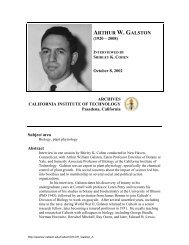Interview with David Baltimore - Caltech Oral Histories
Interview with David Baltimore - Caltech Oral Histories
Interview with David Baltimore - Caltech Oral Histories
Create successful ePaper yourself
Turn your PDF publications into a flip-book with our unique Google optimized e-Paper software.
<strong>Baltimore</strong>-34<br />
BALTIMORE: No, I’m not tired. I could talk about myself forever. [Laughter]<br />
LIPPINCOTT: Oh, that’s wonderful!<br />
BALTIMORE: I look at these kinds of things—which I’ve done in various venues, actually—as a<br />
substitute for writing an autobiography. And this thing [points to recorder] seems to have an<br />
infinite capacity, so—<br />
LIPPINCOTT: Yes, it does. It’s not like the old tape machine, where you had to watch the tape.<br />
Renato Dulbecco—did he bring you to Salk, and how did you know him<br />
BALTIMORE: Well, I think he showed up at Cold Spring Harbor. He was a phage biologist<br />
originally; he knew what I had been doing. When Richard Franklin and I published a whole<br />
series of papers that really set the basis for biochemical analysis of RNA viruses, the world had<br />
never heard of <strong>Baltimore</strong> and the world had never heard of Franklin. And we would get<br />
inquiries: “Which one of you is the senior member of this team” Because Richard was a young<br />
assistant professor and had never done this kind of work before. He didn’t do that kind of work;<br />
I did it. But he was my coauthor on all of this, and that’s fine, and I give him all the credit in the<br />
world for helping me be the success that I became. But people knew the papers of <strong>Baltimore</strong> and<br />
Franklin—everybody did, in the animal virus field. So Renato certainly knew the work that I’d<br />
done. So Renato shows up in New York to give a series of lectures, maybe at Rockefeller. I’m<br />
at Albert Einstein, and he calls ahead and says, “I want to talk to you.” He was at <strong>Caltech</strong> at the<br />
time, and he told me about the Salk Institute development—that this was going to be built, that<br />
he was going there, and would I want to come and take a piece of his laboratory and start my<br />
own independent work in his laboratory. He would arrange for me to get funding and a position.<br />
It sounded like heaven. By this time, I was ready to think about going to California.<br />
LIPPINCOTT: This was an entirely new enterprise, wasn’t it<br />
BALTIMORE: It was an entirely new institution; it hadn’t been built yet. It was just being<br />
formulated, and it was really Szilard who was the man behind it.

















